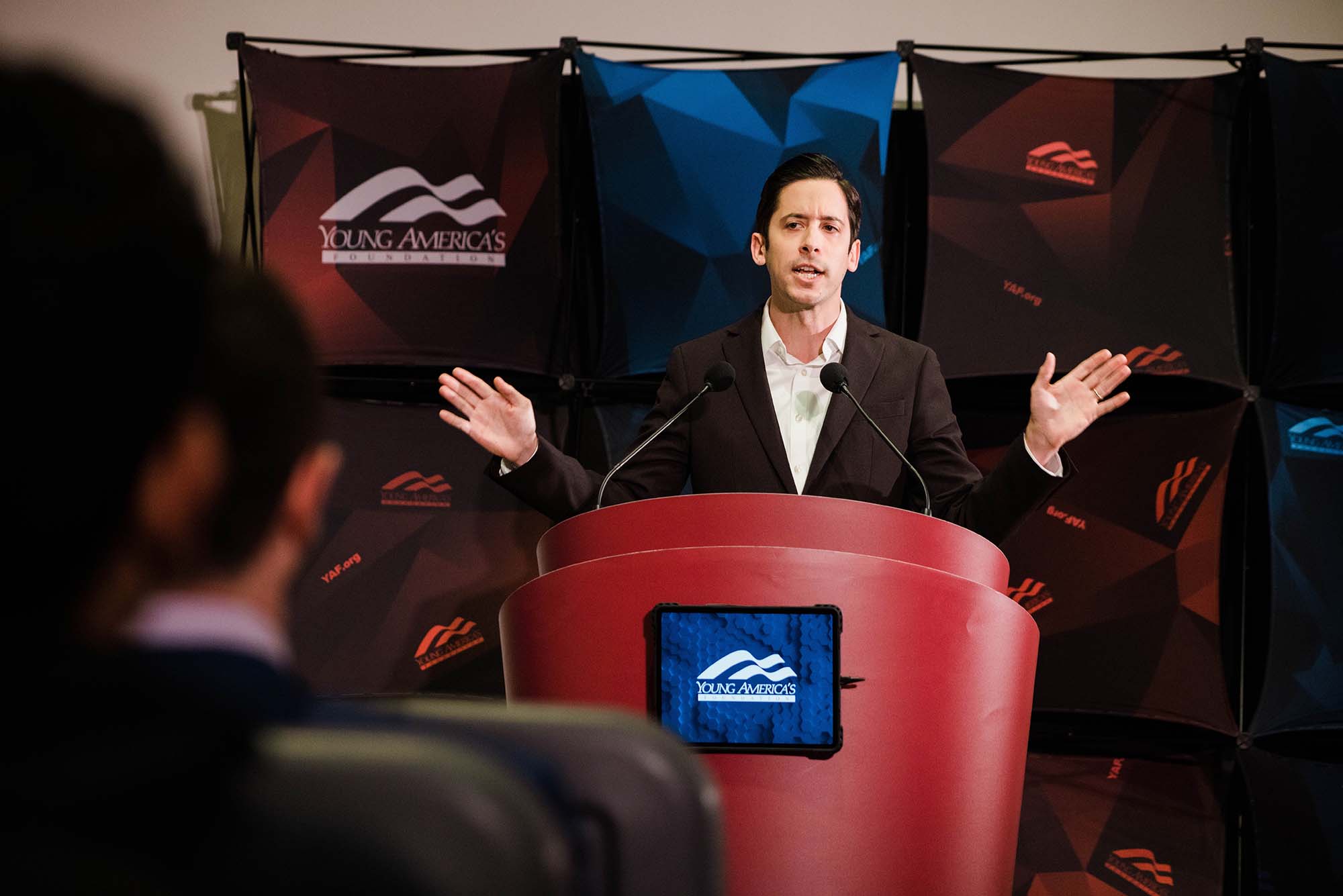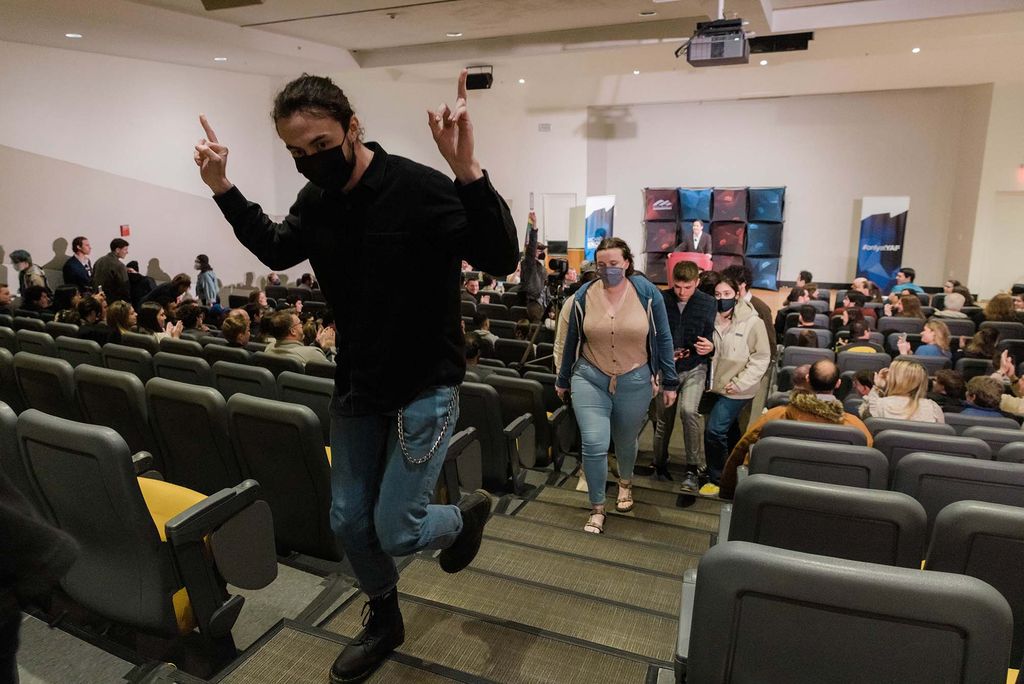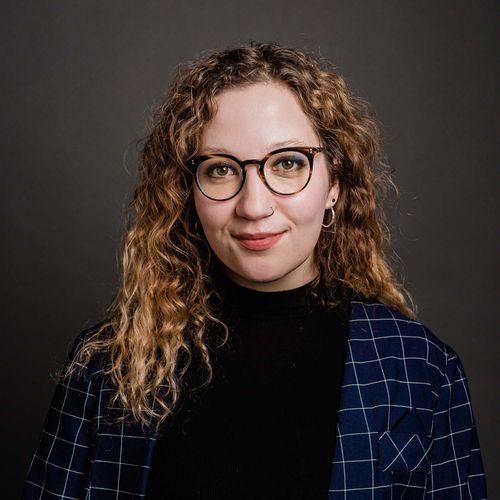Conservative Speaker Michael Knowles’ Speech at BU Sparks Walkout

Political commentator Michael Knowles speaking to a crowd at Boston University Thursday night. “You cannot keep your mind open indefinitely or your brain will fall out,” he told listeners.
Conservative Speaker Michael Knowles’ Speech at BU Sparks Walkout
Message from political commentator, invited by student club Young Americans for Freedom: Teach the ABCs, not LGB(T)s
Michael Knowles, a conservative political commentator whose talks on college campuses have often sparked protests and walkouts, gave a talk at Boston University Thursday night titled Teach the ABCs, not LGB(T)s. Knowles was invited by the BU chapter of the conservative college students organization Young Americans for Freedom (YAF).
Multiple BU student groups organized a peaceful protest in response to Knowles’ appearance. Early in his speech, close to 40 members of BU’s Students for Reproductive Freedom, Young Democratic Socialists, Trans Listening Circle, Queer Activist Collective, Mental Health Collective, and OutLAW, plus other students, walked out of the auditorium en masse. The groups also organized safe spaces throughout campus for trans and queer students while the event was being held.
Among other topics, Knowles’ speech focused on what he said are the dangers of grooming and indoctrinating schoolchildren by teaching them unnatural sex and gender ideology, as well as his assertions that transgender youth are delusional. After the talk, Knowles participated in an audience Q&A.
“Very radical, very creepy people are trying to indoctrinate children into sexual ideologies,” Knowles stated at one point. “Just yesterday, Jen Psaki, the spokesperson for the president, was literally crying at the prospect that she might not be allowed to trans the kids.”
The 32-year-old Knowles, a Yale University graduate and author of Speechless: Controlling Words, Controlling Minds (Regnery Publishing, 2021), hosts a regular series on the conservative news website Daily Wire and is the author of Reasons to Vote for Democrats: A Comprehensive Guide (Threshold Editions, 2017), a satirical book with mostly blank pages. He’s also a frequent guest on college campuses, where he’s delivered such talks as Men Are Not Women and Banning Transgenderism, which have been both widely attended and met with protests.
Knowles is a YAF favorite, a member of the BU club’s e-board told BU Today, requesting anonymity. “He’s not afraid to say what’s on his mind,” the YAF member said, adding that the club asked that Knowles speak on sex and gender in the classroom, but left the specifics up to him.
YAF held the talk in the LAW Auditorium. The sold-out event drew a little under 200 attendees, a mix of students from BU and other universities as well as the general public.
In November 2019, BU’s YAF chapter hosted right-wing pundit Ben Shapiro, an event that spurred widespread outrage and vocal protests on campus. The response to Knowles, in contrast, was far more subdued.
When asked, many people waiting in line to enter declined to comment about what drew them to the Thursday night event. One student, Pathin Patel (Questrom’22), said he’d seen Knowles’ content before and was intrigued by the idea of a campus event. “I wouldn’t say I agree with him 100 percent, but I’m receptive to what he says, and I find it interesting at the very least,” Patel said.
But as with Shapiro’s talk, not everyone at BU was pleased with Knowles’ appearance on campus.

Student organizers knew Knowles was expecting a demonstration based on his Twitter account, said Students for Reproductive Freedom (SRF) copresident Charlotte Beatty (CAS’22). By walking out of the event instead of picketing outside, Beatty said, “we were trying to avoid how much we fuel his ego and just leave blank seats in the space. Our goal was to promote trans solidarity and give as little engagement as possible to Knowles.” (SRF later released a statement condemning the event.)
Many of the protesting groups expressed disappointment that Knowles was allowed to speak at BU.
BU’s official statement on free speech and expression says: “The University believes that freedom of speech and expression are essential to, and compatible with, the principles articulated in Boston University’s Statement on Diversity. The University embraces the guiding principle that the remedy for speech that some may find hurtful, offensive, or even hateful is not suppression of speech, but more speech.”
Even though Knowles was invited by students, some of the protesting groups still argued that BU should not have allowed his speech to occur.
“Knowles’s speaker engagements are grounded in the dangerous misconception that the existence of LGBTQ+ people—especially the transgender and gender-nonconforming community—poses a threat to young people, and should therefore be suppressed and erased,” reads a statement from the Queer Activist Collective (Q).
“BU’s Statement on Free Speech and Expression explains that speech ‘incompatible with the safety of the [University] community’ is not protected, yet Boston University leadership permits the spread of Knowles’s transphobic rhetoric on campus. This implies that transphobic rhetoric is not only deemed acceptable by Boston University, but is also ‘protected.’
“By providing Knowles with a platform, Boston University sends the message that his harmful rhetoric is welcome here.”
The event also came amidst a record boom in anti-LGBTQ+ legislation across the nation—including Texas’ anti-transgender directive—as well as controversial bills like Florida’s Parental Rights in Education Act, which prohibits classroom discussion of gender and sexual identity among K-3 students. That bill was the subject of much of Knowles’ speech.
The timing was not lost on the student protesters. “With everything going on right now with Florida’s ‘Don’t Say Gay’ bill and countless other homophobic/transphobic laws being passed, students are deeply upset that BU is allowing this event to take place,” SRF’s Beatty said.
By inviting Knowles to speak, YAF hoped to incite discussion around the Florida bill and other topics, according to the e-board member who spoke to BU Today, noting that members’ own differing views on sex and gender in the classroom sparked almost three full meetings of debate.
“We at YAF are not anti-LGBTQ+,” the YAF student maintained ahead of the event. “The Florida bill is a big talking point and it created a lot of discussion, and Michael Knowles is going to continue that discussion tonight.”
Although BU has taken steps to support the LGBTQ+ community, students say the University could do more. For one, creating an LGBTQ+ student resource center modeled after the LGBTQIA+ Center for Faculty & Staff would be helpful, as would allowing transgender, gender-nonconforming, and intersex (TGNCI) students to more easily change their name, gender, and pronouns with the Registrar’s office and other BU records. One of the most important measures, however: comprehensive LGBTQ+ training for faculty and staff.
“Training is so deeply important,” says Q outreach coordinator and transgender student Leo Ruiz (CAS’24), who says faculty members have often ignored him being misgendered in the classroom, and that multiple staffers have given him strange looks after seeing the picture on his BU ID.
Q’s statement also includes a call to action for cisgender community members.
“To our cisgender allies: let this moment ignite a desire to commit yourself to trans activism. Activism means both educating yourself about the issues we face and participating when trans activists call on you to do so. As allies, it is your responsibility to listen when these organizers speak; to recognize and value the humanity of TGNCI people; to stand up for us when you hear information being spread about us that is biased and factually incorrect; to interrupt the dangerous power dynamics which place TGNCI people in harm’s way.”
A livestream of Michael Knowles’ speech is available here.

Comments & Discussion
Boston University moderates comments to facilitate an informed, substantive, civil conversation. Abusive, profane, self-promotional, misleading, incoherent or off-topic comments will be rejected. Moderators are staffed during regular business hours (EST) and can only accept comments written in English. Statistics or facts must include a citation or a link to the citation.